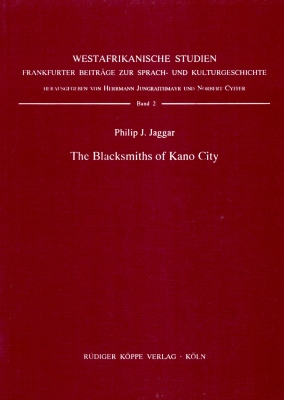
The Blacksmiths of Kano City
A Study in Tradition, Innovation and Entrepreneurship in the twentieth century
Author: Philip J. Jaggar †. Series edited by: Herrmann Jungraithmayr, Norbert Cyffer.
Series: WeStu Westafrikanische Studien Volume 2
199410 pp. Roman, 110 pp.
6 maps, 7 tables
Text language(s): English
Format: 170 x 240 mm
260 g
Paperback
€ 29.80
Buy 'The Blacksmiths of Kano City' as a downloadable PDF document directly from our online shop »
Order 'The Blacksmiths of Kano City' as print edition »
The present book examines the factors involved in the expansion, during the colonial and post-colonial periods, of a traditional pre-European craft. It discusses the art of blacksmithing in Kano City, northern Nigeria, and its eventual conversion into a modern metalworking industry. In doing so, it challenges the widely-held and simplistic assumption that such traditional professions declined before the economic and technological onslaught of colonialism. The book deals with historical, economical, and ethnographical questions and their relationship to the changes in the craft brought about by alterations in the political landscape. This includes for instance World War II and its implications for the blacksmiths of Kano, the development of a strategy for dealing with imported goods, or the substitution of formerly traditionally produced scrap iron. Numerous biographies of individual blacksmiths enable the reader to take the point of view of the persons concerned as well as of the author.
Following the link below, you will find blog articles after the author’s demise:
https://www.soas.ac.uk/study/blog/tributes-philip-j-jaggar-soas-hausa-scholar
Accompanying material:
- Advances in Kanuri Scholarship
(ISBN 978-3-89645-104-0 ) - Clapperton in Borno
(ISBN 978-3-927620-54-4 ) - Kanuri, Borno and Beyond
(ISBN 978-3-89645-892-6 ) - Trade, Merchants and the State in Borno, c. 1893-1939
(ISBN 978-3-89645-212-2 )
Cross-reference:
Reviews
"This excellent case study is almost twenty years old. [...] But despite some signs of age [...] Jaggar's tightly focused, well-documented investigation is a fresh and welcome addition to the literature on African economic history. That this would be so only underscores that in the intervening years most scholars continued to ignore the history of craft production in Africa and how particular craft occupations changed over time. Some critics will rush to judgment and call this study a relic from a bygone Africanist past. Others might fault it for not adopting a different focus, say, on slavery or on technology. But to most scholars, I would hope, the treasure of detail in this otherwise modest volume will signal a reminder that there is always room for careful empirical work that can stand the test of time and open up neglected areas of historical research."
Colleen E. Kriger in Journal of African History, 37/1 (1996), 165f
Für die Darstellung der sozialen und wirtschaftlichen Verhältnisse der Schmiede und die raschen Veränderungen ihrer Arbeitsbedingungen in Kano ist der vorliegende Band ein wertvolles und unersetzbares Dokument. Insbesondere die an die Gegenwart heranreichende Periode wird durch ihren Reichtum an Details und durch die Lebensläufe sehr plastisch beschrieben.
Hans Peter Hahn in Zeitschrift der Deutschen Morgenländischen Gesellschaft, 146/2, 1996, 650-652
| « back | Print version | [top] |
 Books
Books Audio
Audio Biographies
Biographies Series
Series Festschrifts
Festschrifts Journals
Journals